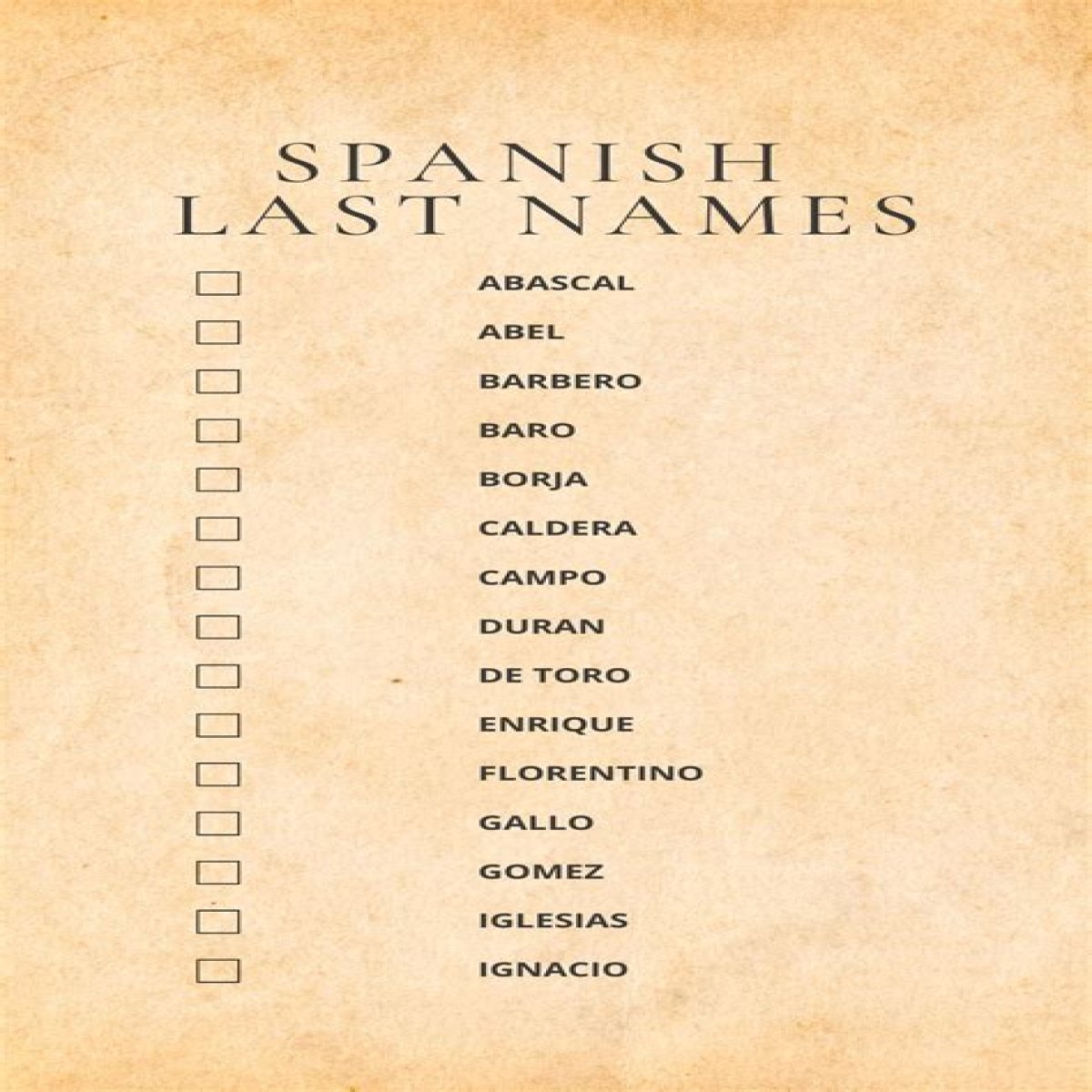Last names of Spain carry a rich tapestry of history, culture, and heritage that echoes the journey of the Spanish people throughout the centuries. These surnames are not just identifiers but also tell stories of lineage, geographical origins, and even professions. The significance of a last name in Spain can reveal a person's ancestry, social standing, and sometimes, their very identity. In this article, we will delve into the fascinating world of Spanish last names, their meanings, and their cultural implications.
In Spain, surnames often reflect a mix of influences stemming from the country's diverse history, including the Roman, Visigoth, and Moorish conquests. This blend of cultures has produced a unique set of last names that are recognized and celebrated worldwide. Additionally, many Spanish surnames are patronymic, meaning they derive from the name of a father or ancestor, which adds another layer of meaning to these family names.
As we explore the last names of Spain, we will also touch upon notable personalities who share these surnames, offering insight into how their names have shaped their identities and legacies. By understanding these last names, we can gain a deeper appreciation for Spanish culture and the stories that each name holds.
What Are the Most Common Last Names in Spain?
Among the last names of Spain, several stand out due to their widespread usage. The most common surnames include:
- García
- Fernández
- González
- López
- Martínez
These surnames have a historical significance and are often associated with many famous individuals in Spanish history.
How Did Last Names Evolve in Spain?
The evolution of last names in Spain dates back to the Middle Ages when individuals began to adopt surnames to differentiate themselves. Initially, these names were often derived from:
- Patronymics (father’s name)
- Occupational roles
- Geographical locations
- Physical attributes
This system allowed for a more organized society, as it became essential to identify individuals accurately.
What Do Spanish Last Names Mean?
The meanings behind many last names of Spain can provide fascinating insights into family histories. For instance:
- García: Thought to originate from the Basque word for "young" or "bear."
- Fernández: Means "son of Fernando," linking to a common given name.
- González: Translates to "son of Gonzalo."
Understanding these meanings adds a personal touch to the names, connecting individuals to their ancestry.
Who Are Some Notable Figures with Spanish Last Names?
Many famous personalities share the last names of Spain, contributing to the rich cultural heritage of the country. One such individual is Pablo Picasso, an influential artist whose name resonates globally. Below is a brief biography and personal details of Pablo Picasso:
| Name | Pablo Diego José Francisco de la Rivera Picasso |
|---|---|
| Born | October 25, 1881 |
| Died | April 8, 1973 |
| Nationality | Spanish |
| Occupation | Painter, Sculptor, Printmaker |
| Famous For | Cubism, Blue Period, Rose Period |
What Role Do Last Names Play in Spanish Culture?
Last names in Spain hold significant cultural importance, often reflecting a family's history and social status. They are a source of pride and identity, linking generations together. In many Spanish-speaking communities, it is customary to inherit both parents' surnames, which showcases the importance of family lineage.
How Do Last Names Reflect Regional Differences in Spain?
Spain is a country of diverse cultures and regions, and this diversity is reflected in its last names. For example:
- In Catalonia, surnames like "Pujol" or "Roca" are common.
- In the Basque region, names such as "Etxeberria" (meaning "new house") are prevalent.
- In Andalusia, you might find surnames like "Sánchez" or "Ramírez."
These regional differences highlight the unique identities within Spain and the historical ties to various locations.
What Challenges Exist in Tracing Spanish Last Names?
Tracing the lineage of Spanish last names can sometimes be challenging due to various factors such as:
- Common surnames that can lead to confusion.
- Historical records that may be incomplete or difficult to access.
- Changes in spelling over generations.
Despite these challenges, many individuals are dedicated to uncovering their family histories and understanding the significance of their last names in Spain.
How Can One Research Their Spanish Last Name?
For those interested in researching their last names of Spain, several resources can be helpful:
- Online genealogical databases
- National archives and libraries
- Local historical societies
Additionally, connecting with family members can provide valuable insights into personal histories and the meanings behind surnames.
In conclusion, the last names of Spain are more than mere identifiers; they are a reflection of the country's rich history and cultural heritage. By understanding these surnames, we appreciate not only our own identities but also the stories that connect us to the past. Whether through notable figures like Pablo Picasso or through personal family histories, the exploration of Spanish last names offers a fascinating glimpse into a vibrant culture.
Unveiling The Mystery: How Old Is Daniel Ferri?Unveiling The Life Of Rickey Smiley's First WifeDiscovering The Heartfelt Essence Of "Love Somebody" By Morgan Wallen
